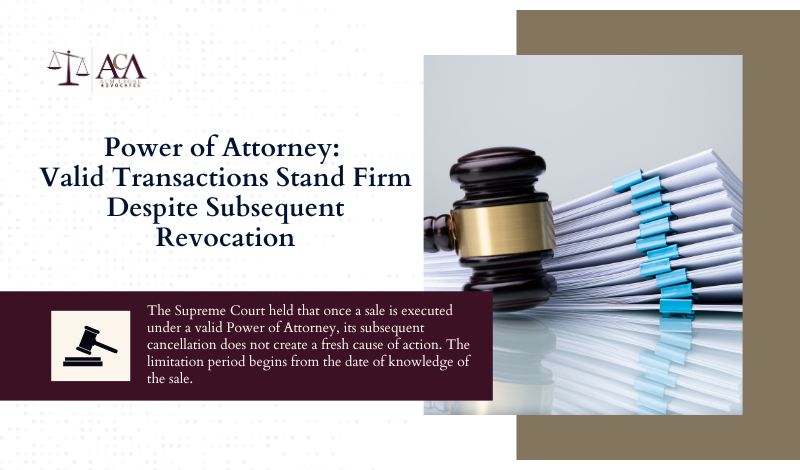Case Title: V. Ravikumar v. S. Kumar
This case pertains to the rejection of a plaint on the ground of limitation. The core issue revolved around whether the cancellation of a power of attorney (PoA) could give rise to a fresh cause of action for challenging sale deeds executed under it. The Supreme Court, while allowing the appeal, held that the limitation period for challenging such transactions begins from the date of knowledge of the sale deeds, and not from the date of cancellation of the PoA.
Factual Background
The dispute arose from a General Power of Attorney (PoA) executed by the plaintiff, V. Ravikumar, in favor of the first respondent, S. Kumar, on October 15, 2004. Acting under the authority conferred by the PoA, the respondent executed multiple sale deeds between 2004 and 2009.
The plaintiff alleged that he became aware of these transactions only on September 21, 2015, and subsequently canceled the Power of Attorney on September 22, 2015. Claiming that the transactions were fraudulent, he filed a suit on September 20, 2018, seeking a declaration that the sale deeds were null and void, along with an injunction restraining the defendant from interfering with his possession of the suit properties.
The defendant, in response, filed an application under Order VII Rule 11 of the Code of Civil Procedure, 1908, read with Sections 10, 11, and 150, contending that the suit was barred by limitation. The Trial Court accepted this contention and rejected the plaint, reasoning that the plaintiff had knowledge of the transactions as early as January 10, 2015, when a patta (land revenue record) reflecting the conveyance was issued.
The plaintiff, however, challenged this order before the High Court of Madras, which reversed the Trial Court’s decision. The High Court held that the limitation period should commence from the date of cancellation of the Power of Attorney, i.e., September 22, 2015, and thus, the suit was not time-barred. Consequently, the suit was directed to be restored for adjudication on merits.
The defendant then filed an appeal before the Supreme Court, challenging the High Court’s interpretation of the commencement of limitation.
Observations of the Supreme Court
The Supreme Court, while analyzing the case, disagreed with the High Court’s finding that limitation should commence from the date of cancellation of the Power of Attorney (September 22, 2015). The Bench comprising Hon’ble Mr. Justice Sudhanshu Dhulia and Hon’ble Mr. Justice K. Vinod Chandran held that:
1. The plaintiff did not dispute the execution of the Power of Attorney in 2004, which had expressly conferred authority on the defendant to execute conveyances.
2. Once a valid Power of Attorney is executed, any sale deeds executed under its authority remain legally valid, unless challenged within the prescribed limitation period.
3. The cancellation of the Power of Attorney in 2015 had no bearing on transactions lawfully executed under its authority before the cancellation. The Court observed that cancellation does not create a fresh cause of action to challenge prior conveyances.
4. The knowledge of the sale deeds, rather than the date of cancellation of the Power of Attorney, determines the starting point of limitation.
5. The Trial Court had correctly found that the plaintiff had knowledge of the transactions at least by January 10, 2015, when a patta reflecting the transfer of ownership was issued. Since the suit was filed only on September 20, 2018—beyond the three-year limitation period prescribed under Article 59 of the Limitation Act, 1963—it was clearly barred by limitation.
The Court further emphasized that accepting the plaintiff’s argument would lead to legal uncertainty, allowing settled transactions to be challenged indefinitely. It categorically stated that there was no allegation that the Power of Attorney was obtained through fraud or coercion, nor was there any contention that it did not confer authority to execute the sale deeds.
Accordingly, the Supreme Court set aside the High Court’s order and restored the Trial Court’s decision rejecting the plaint as time-barred.
Judgment and Final Decision
In its final ruling, the Supreme Court allowed the appeal and affirmed the rejection of the plaint. The Bench categorically held that the High Court erred in treating the date of cancellation of the Power of Attorney as the commencement of the limitation period. Instead, the limitation period begins from the date of knowledge of the sale deeds executed under the authority of the PoA, and not from its subsequent cancellation.
The Court concluded with the following key findings:
1. The cancellation of a Power of Attorney does not affect transactions lawfully executed under it before the date of cancellation.
2. There was no fraud or misrepresentation alleged regarding the execution of the Power of Attorney, and the conveyances were carried out in exercise of legally conferred authority.
3. The plaintiff’s knowledge of the transactions was established at least as early as January 10, 2015, and the suit filed in September 2018 was clearly beyond the three-year limitation period.
4. The High Court’s decision was set aside, and the Trial Court’s rejection of the plaint was restored.
Accordingly, the Court ruled:
“We are definitely of the opinion that the High Court had erroneously treated the cancellation as the point of commencement of limitation. The conveyances having been made between 2004 and 2009, there cannot be any cause of action ferreted out on the basis of the cancellation of the Power of Attorney, after more than 11 years.”
The appeal was allowed, and all pending applications were disposed of.
This judgment reinforces the settled legal principle that transactions executed under a valid Power of Attorney remain unaffected by its subsequent cancellation, and limitation must be determined based on knowledge of the transaction, not the date of cancellation.






